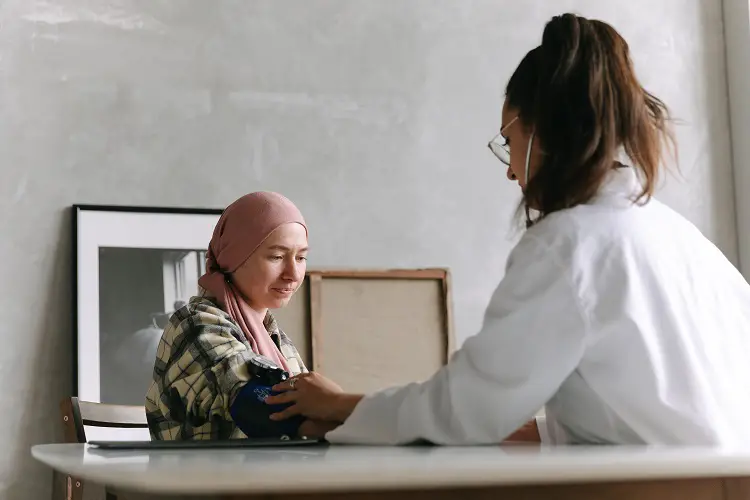Hair loss during pregnancy is one price some women pay when expecting a baby. The overwhelming joy you feel is next to nothing but like every precious gift, it doesn’t come without a price.
But of course, the price you pay is nothing compared to the joy a baby brings so even while paying the price, it is almost as if nothing is happening.
Emphasis on ‘some’ because while others expectant mothers are victims of hair loss, others are beneficiaries of skyrocketing hair growth.
In this article, we discuss everything you need to about hair loss during pregnancy, possible causes, and what to do to prevent it.
Can You Lose Hair During Pregnancy?
Women experience a lot of changes to their hair while pregnant. Some may experience hair loss, while some may notice their hair becoming shinier and stronger.
This is a result of higher levels of estrogen hormone, which can stimulate hair follicles. During this period, some women may notice their normally curly hair becomes straight or vice versa.
Some women may experience hair loss during pregnancy, as their hair becomes thinner or falls out more. These usually occur during pregnancy and continue postpartum.
As a woman going through this, this can be quite concerning, even though is not permanent, it is just a temporary result of shifting hormones or the normal stresses that comes along with pregnancy.
More so, you should be aware that hair loss in pregnancy can also be a sign of a more serious medical condition.
What Causes Hair Loss During Pregnancy?

If you are not used to picking out hairs from your bathroom after a regular shower but started noticing hairs after each shower, best believe that one out of these options listed below is behind it.
- Hormonal changes during pregnancy
- Nutritional deficiencies
- Stress
- Lack of proper care
- Health issues unrelated to pregnancy
1. Hormonal Changes during Pregnancy
During Pregnancy, a woman’s body undergo some hormonal changes which either support the pregnancy or the menstrual flow.
During this process, certain hormones are secreted which cause certain changes in behavior and the physical body.
In menstruation, progesterone is produced more by her body while in Pregnancy, estrogen is produced more to support the development of a new body in her.
The secretion of high estrogen levels in the body most times slows down hair growth and causes hair shedding.
2. Nutritional Deficiencies
Some women experience pregnancy-induced anemia which is a result of deficiencies in iron. When there is low iron, the body produces low red blood cells which are responsible for transporting oxygen around the body including the hair.
The absence of iron equals little red blood cell production equals less transporting oxygen around the body which would eventually lead to hair shedding.
Most pregnant women are at an increased risk of developing iron-deficiency anemia, especially if their pregnancy gaps are spaced closely together, or maybe pregnant with twins, or they have severe morning sickness. This condition is usually diagnosed using a blood test.
Although hair loss during pregnancy isn’t permanent, your hair may not return as it was before until hormone or vitamin levels have returned to their normal level.
3. Stress
The hormonal shift that occurs in the body sometimes triggers what is known as telogen effluvium (TE) meaning stress-induced hair loss.
During Pregnancy, you are bound to shed more hair due to the stress your body is experiencing.
But it is not a terminal disease nor is it permanent, after a few months when your body must have made proper adjustments, the hair shedding reduces.
4. Lack of Proper Care
It is no news that some women are known to assume the image of one who looks more like the shadow of herself during pregnancy. Reasons? Stress? Laziness? Weird cravings? Or have they always been that way but only taking cover?
But for some reason, even those who were known to be meticulous about their appearance suddenly appear the opposite.
This appearance which is caused by a lack of proper care, especially for hair, can cause massive hair loss during pregnancy.
5. Health Issues Unrelated To Pregnancy
Losing a certain amount of hair while combing or during a shower is normal but losing chunks of hair that may cause balding may not necessarily be related to the baby bump.
This could be a genetic condition or an autoimmune condition but in either case, your gynecologist is the best to visit when you notice this. Some autoimmune conditions that may cause massive shedding or balding:
Androgenetic Alopecia is gradual balding in females. It slows down the hair growth rate and increases its thinning and eventual shedding.
Alopecia areata, hair loss occurs in patches unlike the sister in crime Androgenetic alopecia, it is not so gradual and it is unpredictable as there’s no real cure.
Other possible causes of hair loss during Pregnancy may include using harsh hair treatments before the bump or during the pregnancy.
Hair Loss During Pregnancy: What To Do

There are ways to manage hair loss during pregnancy that would reduce the shedding IF the baby bump induces it.
In every cause of hair loss mentioned above, there are certain things to do in each case.
- Consume enough healthy, balanced diets. You should eat enough protein, iron, and other healthy nutrients. You can also speak to your doctor about the best prenatal vitamin, whether OTC or by prescription.
- Talk to your doctor to know if any of the medications or supplements you’re taking is adding to your hair loss.
- You should skip tight braids, buns, ponytails, or any other hairdo that may pull at your hair. While doing this, stop twisting, pulling, or rubbing your hair.
- Ensure you mildly wash your hair and use a wide-toothed comb to avoid pulling hair too hard while detangling.
- Allow your hair to rest without harsh treatments like hot rollers, curling irons, or hot oil and permanent treatments.
- Talk with your health care provider, sometimes the reason behind your hair loss may not be easily determined with a physical exam. Since hair loss during pregnancy is usually temporary, other cases may need proper care for either increasing vitamin levels or regulating hormone levels.
If you’re already lost hair during pregnancy, you can try volumizing shampoos and conditioners. Heavy formulas can also weigh hair down.
Also when conditioning your hair, pay more attention to the ends of your hair instead of the scalp for more lift.
There are certain kinds of hairdos, like a short bob, this can of hairdo may help your hair look fuller while it grows back.
What About Hair Loss After Pregnancy?
Hair loss after pregnancy is known as postpartum hair loss. Some women experience hair loss after delivery.
Postpartum hair loss usually occurs 3-4 months post-delivery, this could be due to the abrupt fall in estrogen level, but over time it all goes back to normal.
Is Hair Loss A Sign Of Pregnancy?
Since women experience hair loss often after pregnancy and not during, this should not be considered a sign that one is pregnant.
Many women experience hair loss during their early pregnancy, which may be attributed to stress or hormone-related.
One must be conversant with the knowledge of hair growth and how it functions at any given time.
Naturally, all hair goes through a lifecycle. And while 90% of your hair is in a growth phase, the rest is in a resting phase.
The resting hair falls off every 2-3 months to create room for new hair to grow. So some hair loss is inevitable, ongoing basis happens to everyone.
But, if you notice excessive amounts of hair falling out, especially in the early months of pregnancy, stress and hormones could be the cause.
Read Also:
- How To Fix Greasy Hair During Pregnancy
- Can I Fast During Pregnancy? Explained
- How To Get Rid Of Pregnancy Line On Your Stomach
Take-Home
For many women, hair loss is one of those phases one can experience during pregnancy, particularly during the postpartum period.
This experience is not permanent. Over time it resolves, usually between six months and a year.
Even if there are medical complications, a doctor can help you find and treat the problem, and your hair will grow back like it never left.
If, however, you’re concerned that your hair loss is too much or other persistent symptoms accompany it, don’t hesitate to consult your doctor to help you get to the bottom of it.
